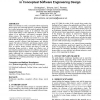Free Online Productivity Tools
i2Speak
i2Symbol
i2OCR
iTex2Img
iWeb2Print
iWeb2Shot
i2Type
iPdf2Split
iPdf2Merge
i2Bopomofo
i2Arabic
i2Style
i2Image
i2PDF
iLatex2Rtf
Sci2ools
114
click to vote
GECCO
2008
Springer
2008
Springer
Agent-based support for interactive search in conceptual software engineering design
While recent attempts to search a conceptual software engineering design search space with multi-objective evolutionary algorithms have yielded promising results, the practical application of such search-based techniques remains to be addressed. This paper reports initial findings of the application of software agents in support of an interactive, user-centered conceptual software design scenario. The supporting role of a number of single responsibility agents is described and results for a case study indicate that the application of such agents to search-based design scenarios provides efficient, high performance and effective support. The notion of interactive, joint human-computer activity appears to map well to conceptual software design scenarios: focus on superior design concepts and thence to useful and interesting designs provides a natural and effective way of narrowing the population based search. In addition, agents and the human designer appear to interact as cooperative â...
Conceptual Software Design | Design Scenarios | Evolutionary Algorithms | GECCO 2008 | Optimization |
Related Content
| Added | 09 Nov 2010 |
| Updated | 09 Nov 2010 |
| Type | Conference |
| Year | 2008 |
| Where | GECCO |
| Authors | Christopher L. Simons, Ian C. Parmee |
Comments (0)

